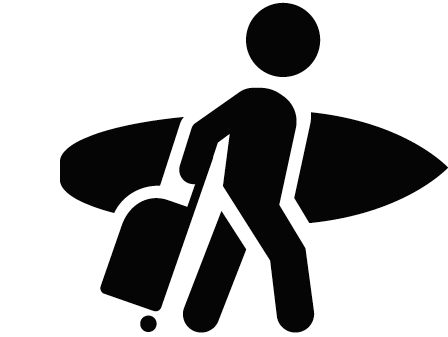Surfing in South Korea

Many people don’t think of South Korea as a surfing destination. Recently passionate South Koreans as well as expats surfers started to explore the coast and find some very good surf spots, which is making surfing pretty popular in the country. These days lots of people are enjoying surfing in South Korea. With three different coastline directions (east, south and west) the country offers multiple surf conditions. Jeju island is the birthplace of surfing in the country and can get some fun waves all year round. Despite the cold weather, the best time to surf in the country is during the winter months. Unlike the northern neighbour, South Korea has an extremely friendly approach to all kinds of tourists. Surf shops are opening all over the country providing top quality surf equipment for the growing surf community. Besides surfing South Korea is famous for an exciting street food scene, the ancient Buddhist temples and more than 5000 years of history and culture.
Climate in South Korea
The climate in South Korea is temperate with four distinct seasons. Winters are long, cold and dry. Summers are short, warm, and wet. Spring and autumn are pleasant but also short in duration. The average temperature in January is around -3° C (25°F) and in July average temperature is around 23° C (73° F). The country has plenty of rainfall, mostly happening between June and September. South Korea is exposed to typhoons that usually pass over in late summer, especially in August and bring torrential rains. In February and March, the water temperature is very low so from around November you will need 4.5mm wetsuit or drysuit, hood, booties and gloves.
Best surf spots in South Korea
Located on the southeastern coast, Busan is a major port city that has much to offer for surfers. Haeundae and Gwangalli are the two major beaches in the city, but for surfing, the preferred spot is Songjeong Beach. Yangyang County in Gangwon Province has recently emerged as the surfing mecca of Korea, featuring great waves and a surfer friendly environment. One of the best places to visit is Surfy Beach, the only beach in Korea exclusively designated for surfing. Access to the beach, once part of a military base, was denied for 40 years, until recently. Public beaches include Jukdo and Gisamun. Jukdo is a great spot for beginners, but Gisamun requires more experience as the waves are stronger.
Budget Planning
Meal price range
Street food starts at $1 USD. Mid-range meals start at $20 USD. Dining & drinking at high-end restaurants can cost anywhere from $65-100 USD
Equipment rental
There are a handful of places where you can rent gear. Board rentals are around $17 USD.
Prepaid SIM cards
kt olleh is a good choice. SIM cards can be purchased from official retailers, shops, Incheon International Airport or approved resellers. Prepaid packages start at $23 USD.
Public transport
Traveling by train is the most efficient way to get around South Korea. All cities have comprehensive bus networks, and many have subway lines. Taxis are easy to find and of good value.
Car rentals start at $52 USD. Note: You will need an International Drivers Permit (IDP) in order to rent a car in South Korea.
Gas prices
$1.41 USD a liter.
Types of risks
Can Get Busy.
Occasional typhoons bring high winds and floods.
How to prepare
Visa
Citizens from 56 countries, including EU, US, and Australia, can enter South Korea without a visa for 90-180 days, depending on which country you are from.
Vaccines
Although it's not mandatory, it’s recommended that you have been vaccinated for hepatitis A & B, typhoid, rabies, meningitis, polio, Tdap, chickenpox, shingles, pneumonia, influenza, measles, mumps and rubella.
Things to know
Language & Currency
Korean is the official language. Many Koreans speak English.
Korean won (₩)
Best time to go
The waves are good in winter or summer.
Checking Surf forecast
Checking the forecast about a week before your trip is always a good idea. Understanding what the waves will be like and knowing what gear to pack is essential. You can check the forecast for the waves here.
Do I need pack a pharmacy kit
You should bring a basic kit. Including ear drops, eye drops, bandaids, ear plugs, gaze, alcohol, mosquito repellent and broad spectrum antibiotic ointment.
Travel/Surf Insurance
World Nomads has great travel insurance packages that are not super expensive and they cover surfing.
Emergency
Dial 119
Check surf pictures of South Korea at #surfingkorea.

